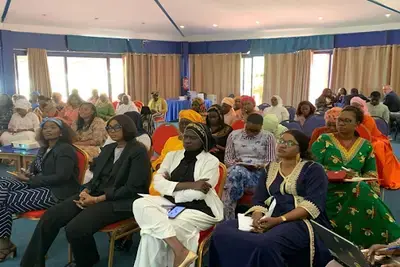
Success Story
South Sudanese Citizens Connect with MPs for First Time
The first-time opportunity to question their elected members of parliament (MPs) was so important to residents of South Sudan that some of them brought their own chairs to standing-room-only constituency dialogues organized in November by the South Sudanese Network for Democracy and Elections (SuNDE), a nonpartisan coalition of community groups.
More than 900 citizens attended the dialogues - three in Juba, the capital, and one in Bor, in central South Sudan - to talk about community concerns directly with their representatives, who were elected in April 2010. SuNDE, which observed that election and South Sudan’s referendum on independence last January, organized the dialogues in partnership with NDI to respond to concerns that MPs had not been interacting with constituents. The meetings also gave the lawmakers a chance to share information about what they’ve been working on since assuming office.
“This is the first time I have seen politicians who have been brought to the citizens so that we could tell them what is hindering the community,” said Andrew Sule Felix, one of the participants. “The important thing is that through dialogues we are able to raise questions to our politicians.”
Citizens in Juba asked about being able to see draft legislation, land rights, crime and how resources are allocated to the military. They also asked MPs to look into environmental damage resulting from an deal between the government and a sewage disposal company that allows the firm to dump sewage in the community.
The MPs answered the citizens with substantive discussions of policy. For example, they assured participants from Juba that South Sudanese who have a right to get land will get it, and promised to discuss the issue with relevant officials. The MPs will also use an existing constituency development fund to build a police checkpoint to help reduce crime. And they announced a plan to drill five wells to provide drinking water for the community and reduce the environmental risks of sewage disposal in the area.
In addition to answering questions, the MPs explained the structure of the still-new South Sudanese government, which has legislative, executive and judicial branches, and explained what they can and cannot do in their role as lawmakers.
SuNDE will hold more dialogues in the new year throughout the 10 states of South Sudan. The group will then follow-up with the communities to see if the MPs follow through on their promises.
Related:
Published Dec. 15, 2011



